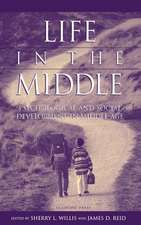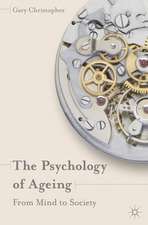Social Cognition and Aging
Editat de Thomas M. Hess, Fredda Blanchard-Fieldsen Limba Engleză Hardback – 17 iun 1999
Preț: 969.64 lei
Preț vechi: 1328.28 lei
-27% Nou
Puncte Express: 1454
Preț estimativ în valută:
185.53€ • 193.73$ • 153.21£
185.53€ • 193.73$ • 153.21£
Carte tipărită la comandă
Livrare economică 15-29 aprilie
Preluare comenzi: 021 569.72.76
Specificații
ISBN-13: 9780123452603
ISBN-10: 0123452600
Pagini: 379
Dimensiuni: 152 x 229 x 25 mm
Greutate: 0.75 kg
Editura: ELSEVIER SCIENCE
ISBN-10: 0123452600
Pagini: 379
Dimensiuni: 152 x 229 x 25 mm
Greutate: 0.75 kg
Editura: ELSEVIER SCIENCE
Public țintă
Academics and researchers in gerontology, adult development and aging, and social psychology. Secondary audiences in developmental psychology and sociology.Cuprins
Contributors.
Foreword.
F. Blanchard-Fields and T.M. Hess, The Social Cognitive Perspective and the Study of.
Focus on Self:
L.M. Soederberg-Miller and M.E. Lachman, The Sense of Control and Cognitive Aging: Toward a Model of Mediational Processes.
C. Hertzog, T.T. Lineweaver, and C.L. McGuire, Beliefs About Memory and Aging.
J.M. Berry, Memory Self-Efficacy in Its Social Cognitive Context.
K. Hooker, Possible Selves in Adulthood: Incorporating Telenomic Relevance into Studies of the Self.
J. Brandtstädter, Sources of Resilience in the Aging Self: Toward Integrating Perspectives.
J.M. Fitzgerald, Autobiographical Memory and Social Cognition: Development of the Remembered Self in Adulthood.
Section II. Focus on Others:
M.L. Hummert, A Social Cognitive Perspective on Age Stereotypes.
J.T. Erber and I.G. Prager, Age and Memory: Perceptions of Forgetful Young and Older Adults.
F. Blanchard-Fields, Social Schematicity and Causal Attributions.
T.M. Hess, Cognitive and Knowledge-Based Influences on Social Representations.
Focus on the Social Context: Interactions Between Self and Other:
R.A. Dixon, Exploring Cognition in Interactive Situations: The Aging of N+ 1 Minds.
M.W. Pratt and J.E. Norris, Moral Development in Maturity: Life-Span Perspectives on the Processes of Successful Aging.
S.T. Charles and L.L. Carstensen, The Role of Time in the Setting of Social Goals Across the Life Span.
U.M. Staudinger, Social Cognition and a Psychological Approach to an Art of Life.
Index.
Foreword.
F. Blanchard-Fields and T.M. Hess, The Social Cognitive Perspective and the Study of.
Focus on Self:
L.M. Soederberg-Miller and M.E. Lachman, The Sense of Control and Cognitive Aging: Toward a Model of Mediational Processes.
C. Hertzog, T.T. Lineweaver, and C.L. McGuire, Beliefs About Memory and Aging.
J.M. Berry, Memory Self-Efficacy in Its Social Cognitive Context.
K. Hooker, Possible Selves in Adulthood: Incorporating Telenomic Relevance into Studies of the Self.
J. Brandtstädter, Sources of Resilience in the Aging Self: Toward Integrating Perspectives.
J.M. Fitzgerald, Autobiographical Memory and Social Cognition: Development of the Remembered Self in Adulthood.
Section II. Focus on Others:
M.L. Hummert, A Social Cognitive Perspective on Age Stereotypes.
J.T. Erber and I.G. Prager, Age and Memory: Perceptions of Forgetful Young and Older Adults.
F. Blanchard-Fields, Social Schematicity and Causal Attributions.
T.M. Hess, Cognitive and Knowledge-Based Influences on Social Representations.
Focus on the Social Context: Interactions Between Self and Other:
R.A. Dixon, Exploring Cognition in Interactive Situations: The Aging of N+ 1 Minds.
M.W. Pratt and J.E. Norris, Moral Development in Maturity: Life-Span Perspectives on the Processes of Successful Aging.
S.T. Charles and L.L. Carstensen, The Role of Time in the Setting of Social Goals Across the Life Span.
U.M. Staudinger, Social Cognition and a Psychological Approach to an Art of Life.
Index.
Recenzii
"...the present text, Social Cognition and Aging, could not have come at a better time. As the first endeavor to consolidate research in this rapidly growing field, this book gives the reader an integrated overview of research being done in social cognition and aging."
--CONTEMPORARY PSYCHOLOGY (2002, Vol. 47, No. 3)
--CONTEMPORARY PSYCHOLOGY (2002, Vol. 47, No. 3)
















